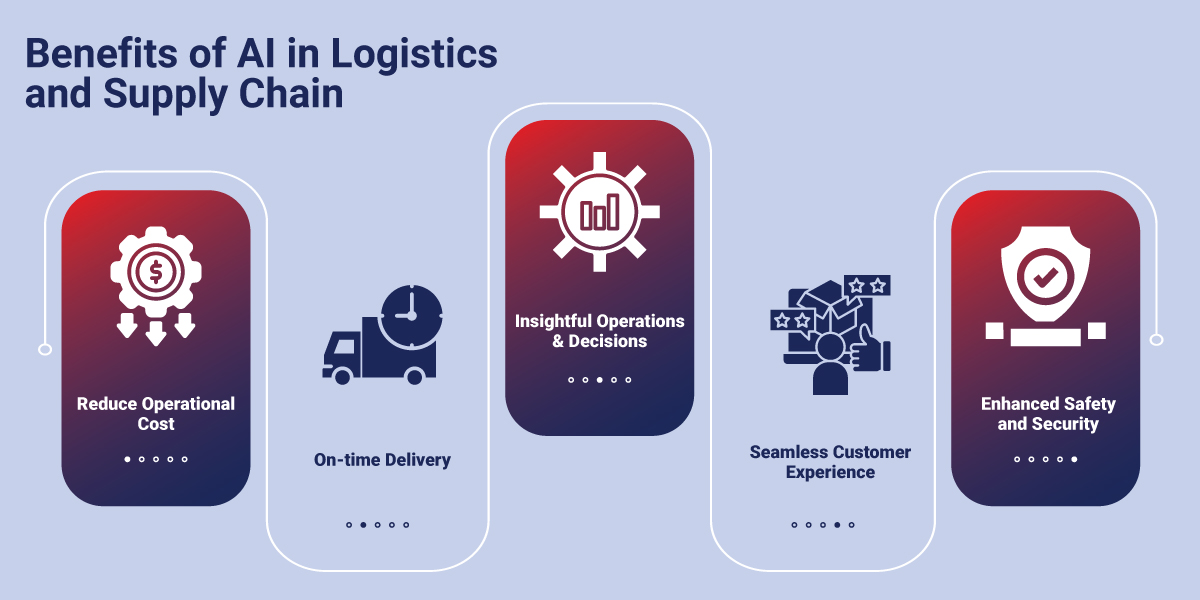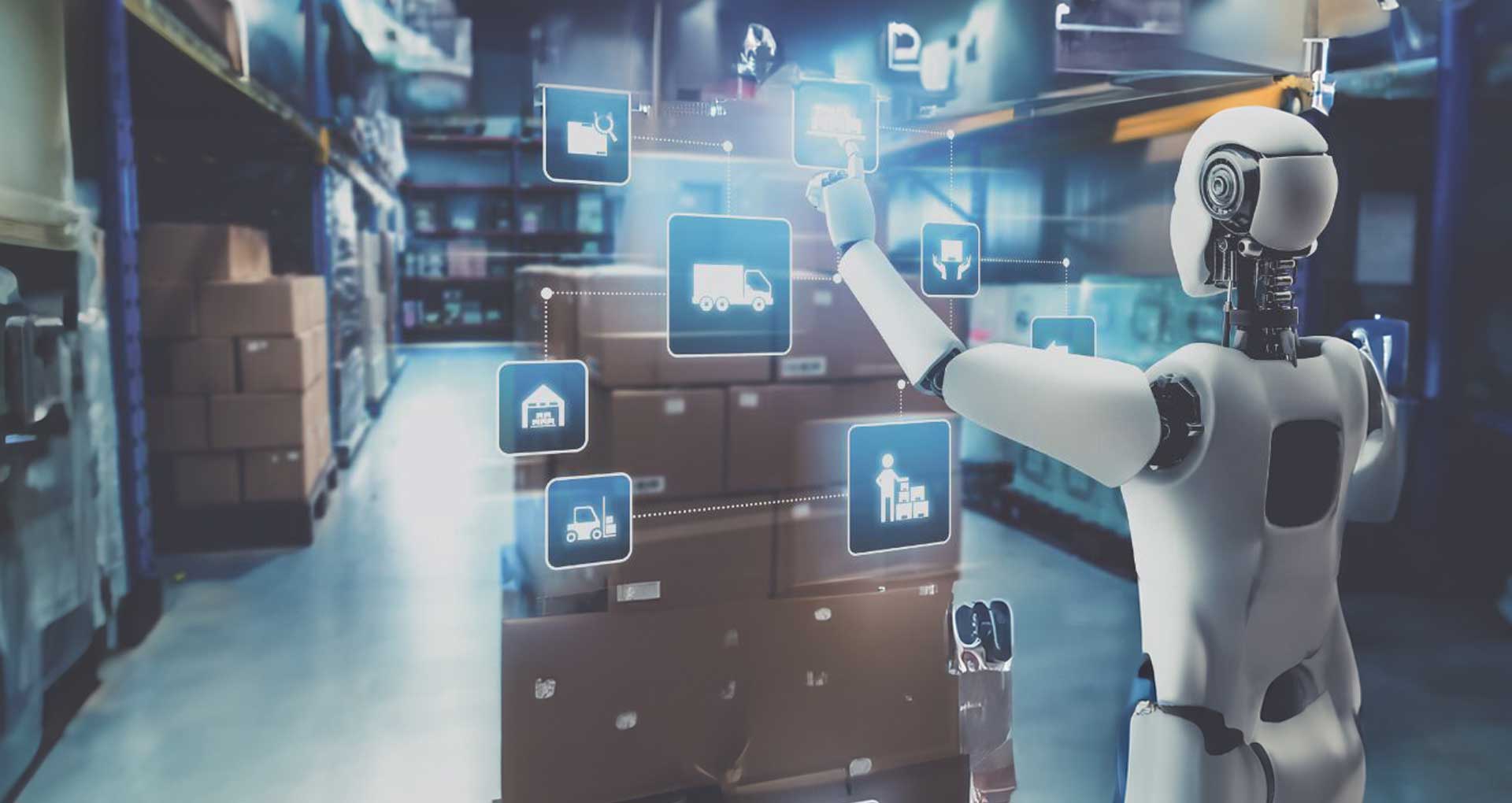Logistics and supply chain management are the spotlight of any business. Surviving in this dynamic market that keeps affecting the sustainability of logistics and supply chain, such as product shortages, economic uncertainty, fluctuating customer demands, and government regulations, is an uphill battle. However, the true game-changer is the integration of automation that exponentially amplifies the value of human efforts ten times to ensure business continuity. This symbiotic relationship powered by AI in logistics and supply chain propels success by achieving operational efficiency, streamlining scheduling to deliver goods, optimizing routes, and elevating customer satisfaction.
The usage of AI in different supply chain and logistics departments is expanding drastically; as per the report, the market size of AI in supply chain and logistics will grow from 3 million in 2022 to 64459.38 million by 2030[1]. According to the experts, Artificial Intelligence and Machine Learning are key technologies that will bring limitless innovation and disruption.
In this blog, we will explore in-depth the role of Artificial Intelligence in logistics and supply chain, its benefits, key applications, challenges, and how AI helps to address them.
Role of AI in Supply Chain and Logistics
The capabilities and potential of AI are now visible to all businesses, including logistics and supply chain management. From reshaping businesses to automating key operations, the role of AI in logistics and supply chain management in any industry is truly transformative.
Incorporating AI in enterprise solutions can revolutionize their logistics and supply chain operations into more mature and optimal procedures. Strategically handling inventory for transportation and warehouse management based on demand forecasting leads to efficient and well-managed manufacturing and distribution.
Companies that started relying on AI early on are now capable of confidently competing in a dynamic market. It allows them to embrace the era of unprecedented efficiency and customer-centricity. AI-powered workflow also helps businesses cut costs in logistics & supply chain operations. Collaborating with an experienced AI consulting company ensures these AI solutions are aligned with your operational goals. Thus, developing and deploying custom logistics and supply chain software solutions enhances efficiency, optimizes the entire supply chain ecosystem, and takes the lead in driving logistics growth.
Applications of Artificial Intelligence in Logistics and Supply Chain
Implementing a digital-first strategy that embraces applications built with cutting-edge technologies like AI helps businesses operate resiliently and sustainably. In this section, we discuss various applications of AI in logistics and supply chains that empower businesses to mitigate risks and ensure a stable supply of goods and services.

Inventory Management
Maintaining the balance between inventory and demand is a complex process since overstocking inventory can escalate the cost for storage & potential of wastage, whereas insufficient inventory level leads to missed opportunities. AI in logistics and supply chain, especially in inventory management, brings a new era of efficiency by redefining businesses handling stocks.
- Inventory demand forecasting: By leveraging advanced algorithms and AI-driven processes, inventory demand forecasting & planning software allows businesses to anticipate previous sales and customer demand shifts and make informed purchasing decisions. Overall, it enhances supply chain management, delivers precise purchasing recommendations, and offers in-depth reporting capabilities.
- Smart Replenishment: AI-powered solution enables retailers to automate their replenishment and shift from traditional to smart processes. By accurately forecasting product demand in the market, calculating optimal order quantities, and determining reorder points, AI technology strengthens business decision-making capabilities for improved process efficiency.
- Automatic Defect Detection: AI-enabled solutions can be trained on a vast pool of data containing patterns of both defective and non-defective products. The model then continuously monitors and closely tracks these patterns, approving products based on multiple metrics. In case deviations occur from the trained pattern, the AI system shares indications through IoT in logistics and supply chain, enabling product managers to address issues promptly.
Warehouse Management System
AI in logistics and supply chain makes way for businesses to go for warehouse modernization that automates and streamlines end-to-end activities associated with warehouses. AI-powered warehouse management system saves time and resources on complex manual work, increases visibility across processes, and enables businesses to respond quickly and accurately to customer orders.
- Warehouse layout optimization: Through AI-driven warehouse management applications, businesses can design the warehouse layout and product placement based on historical data and predict future demand patterns to ensure faster picking and fulfillment.
- Autonomous mobile robots (AMRs): AI-powered and built with deep learning algorithms, AMRs can move and operate independently and easily adapt to environmental changes quickly. They can proficiently be used in warehouse management for picking, putting away, sorting, and transporting inventory, among many other tasks. Their effective utilization can increase warehouse productivity, cut down costs on labor, and create the safest environment.
- Smart packaging selection: AI plays a key role in optimizing the packing process by making it smarter. Based on collected data or data derived from IoT devices and sensors, AI solutions are capable of recommending the most suitable raw materials and sizes for perfect packing. Moreover, machine learning models allow us to focus on other perspectives like transportation routes, storage conditions, and more to further enhance packing choices.
Transportation Management System
According to Precedence research, AI in the transportation market is expected to reach around $23.11 billion by 2032[2]. AI-based transportation management systems in logistics and supply chain management empower businesses to leverage their capabilities in various forms, such as identifying optimal routes, leveraging AI & IoT-based predictive maintenance to avoid costly breakdowns, and creating a way for a sustainable and efficient future.
- Route optimization: Systems with AI capabilities can analyze real-time traffic data, weather conditions, vehicle powers, and delivery constraints. These algorithms can help businesses choose efficient routes for transportation fleets based on factors like traffic and, thereby, reducing fuel consumption and emissions. The entire process fundamentally works toward providing timely deliveries to end consumers, along with improving asset utilization and minimizing transportation costs.
- Predictive maintenance for fleets: AI systems analyze data from telematics sensors and how vehicles and equipment are used. The models use algorithms to predict possible failures and when maintenance is needed based on various metrics. This allows for on-site proactive maintenance scheduling, significantly reducing breakdowns and downtime that can lead to optimized cost constraints. As a result, vehicles become more reliable, asset utilization becomes longer, and maintenance costs decrease.
- Dynamic pricing and capacity management: Dynamic pricing determines the success of businesses in transportation and logistics. By using AI in supply chain and logistics, IT experts can create algorithms that analyze the current pricing of competitors, focus on supply and demand ratios, and other aspects that help businesses set pricing to generate maximum profit.
Supplier Relationship Management System
In the systematic process of identifying, evaluating, and connecting with suppliers, the integration of AI can turn it into a more innovative and fruitful strategy. An AI-powered supplier relationship management system is a crucial helper for businesses to streamline supplier selection, make informed decisions, and ensure that the supplier relationship is aligned with the organization’s strategic goals.
- Supplier performance evaluation: This holistic evaluation enables businesses to be agile and adapt competitive pricing strategies. Combined with other supplier performance evaluation methods, AI-powered tools empower organizations with optimal pricing insights, facilitating strategic procurement decisions and supporting cost-effectiveness and marketplace competitiveness.
- Spend analysis and cost optimization: AI-driven solutions undoubtedly revolutionize this aspect using the power of machine learning algorithms. These systems continuously collect real-time data from myriad sources and then analyze it to provide a comprehensive view of critical metrics that are aligned with an organization’s goals. Examples include on-time delivery performance, quality and defect rates, cost savings, and cost efficiency. If deviations from predefined patterns occur, these AI programs instantly alert procurement professionals. It enables swift, data-backed actions and ensures supplier relationships meet business strategic objectives.
- Risk assessment and mitigation: Supplier risk management powered by AI acts as a defensive shield against disruptions. Training AI models using historical data, like past procurement troubles involving fraud or theft from suppliers, allows organizations to assign a risk score for procurement. Factors resembling those present in prior incidents influence this score, alerting the procurement team about high-risk supplier partners early on. Machine Learning methods such as decision trees and random forests calculate these risk scores. The end result is a robust risk assessment system empowering procurement professionals to take preventive steps, fortifying supplier relationships, and safeguarding against future problems.
Benefits of Integrating AI in Logistics and Supply Chain Management
Businesses are using AI in supply chain and logistics to optimize end-to-end supply chain activities – such as monitoring product quality, maintaining the balance between inventory level and product demand, and fuel-efficient delivery routes. And they are gladly enjoying the myriad benefits of integrating Artificial Intelligence in logistics and supply chain management.

- Reduce Operational Cost: Incorporating AI into various sub-departments of logistics and supply chain processes enables businesses to accomplish daily tasks with greater accuracy and less labor intensity. Furthermore, based on historical data, identifying inefficiencies reduces costs in complex logistics and supply chain operations.
- On-time Delivery: Leveraging AI in route optimization allows for timely pickups and deliveries of components. Additionally, prediction of demand levels empowers more accurate production scheduling, and real-time oversight of supply chain events helps avoid delays in deliveries due to potential disruptions.
- Insightful Operations & Decisions: With analyzed datasets and historical insights, business owners can plan smarter, make efficient use of resources, and make informed decisions regarding raw materials, procurement, inventory storage, and more.
- Seamless Customer Experience: Real-time tracking of product shipments through AI solutions allows customers to be kept informed about product locations and arrival expectations. Through accurate predictions of potential delays, it enables proactive communication with end customers. Moreover, AI-enabled chatbots and virtual assistants offer personalized 24/7 customer support.
- Enhanced Safety and Security: AI systems are capable of tracking and monitoring the work environment and connected activities throughout the logistics and supply chain journey. They help monitor equipment and vehicle health and alter operators in case of any inefficiency or issues. The proactive approach helps avoid any major incidents and ensure safety during operations.
Key Challenges AI is Solving in Supply Chain and Logistics
Identifying operation-hindering challenges and developing ideal solutions is key to streamlining business structure and improving efficiency. In this section, we have covered the key challenges faced by the logistics and supply chain departments and how AI-based solutions can address them.
Uncertainty and Disruptions
Adapting to change is key to streamlining supply chain management. AI tools analyze large data sets and detect patterns that forecast potential disruptions. These actionable insights enable entities to make proactive decisions, and address predicted uncertainties.
AI can further examine factors like weather, consumer trends, and real-time events, allowing supply chain experts to adjust inventory stock, reroute shipments, or modify production schedules before issues arise. By anticipating and responding swiftly to potential problems, AI helps maintain uninterrupted logistics and supply chain operations despite unexpected challenges or fluctuating demands.
Inefficiency and Error
AI-powered tools can automate tasks, better utilize resources, and support smarter choices which helps eliminate inefficiency. AI route mapping finds the best paths, its predictability power analyzes historical data, creates insight for future forecasting on demand, and streamlines end-to-end logistics and supply chain events; this reduces the chances of human errors and boosts efficiency.
Labor Shortage
The Logistics and supply chain industry often faces a labor shortage, especially in inventory management and warehouse management. AI is proficiently addressing this challenge by automating various tasks, including handling material, picking, and sorting in warehouses, reducing the need for manual labor. Also, through an AI chatbot, they offer support to customers around the clock.
Choose Rishabh Software to Streamline Your Supply Chain & Logistics Operations
As a renowned AI/ML service provider, we bring a wealth of expertise and experience in Artificial Intelligence & Machine Learning. Our team of AI and ML experts is dedicated to strategizing and developing advanced and customized solutions incorporating cutting-edge AI algorithms and machine learning model specifically tailored for the logistics and supply chain industry.
Our Artificial intelligence development services are tailored to streamline fulfillment processes, automate complex workflows, and greatly reduce the burden of manual tasks. By harnessing the power of AI, we enable businesses to achieve unprecedented levels of efficiency, accuracy, and operational excellence. At Rishabh Software, we are known for driving digital transformation in the logistics and supply chain industry by integrating Artificial Intelligence (AI) to achieve our mission of empowering businesses with sustainable growth.
Frequently Asked Question
Q: What are the top examples of AI in supply chain and logistics?
A: When it comes to optimizing and transforming the logistics and supply chain workflow, AI offers some practical solutions. Key examples of the usage of AI in logistics and supply chain include:
- Analyzing data and knowledge
- Effectively managing risks,
- Optimizing inventory levels to avoid stockouts and overstocking
- Managing relationships with suppliers and customers
Leveraging AI allows logistics and supply chain management companies to streamline supply chain processes, improve efficiency and foster a culture of data-driven decision making that helps stay competitive.
Q: What is the future of AI in logistics and supply chain?
A: The future of AI in supply chain and logistics is highly promising and will bring transformative advancements in the field of transportation and delivery through autonomous vehicles and drones. We can foresee the combination of predictive analytics and digital twin technology. Further, AI-powered robots and cobots will likely add value in productivity and efficiency.
Q: Steps to implement artificial intelligence in logistics and supply chain management
A: Here is the step-by-step guidance for implementing AI in logistics and supply chain:
- Define Use Cases and Objectives
- Data Preparation and Integration
- Select and Deploy AI Solutions
- Train and Implement AI Models
- Monitor and Optimize
Footnotes:
1. https://www.verifiedmarketresearch.com/product/ai-in-logistics-and-supply-chain-market/
2. https://www.precedenceresearch.com/artificial-intelligence-in-transportation-market








